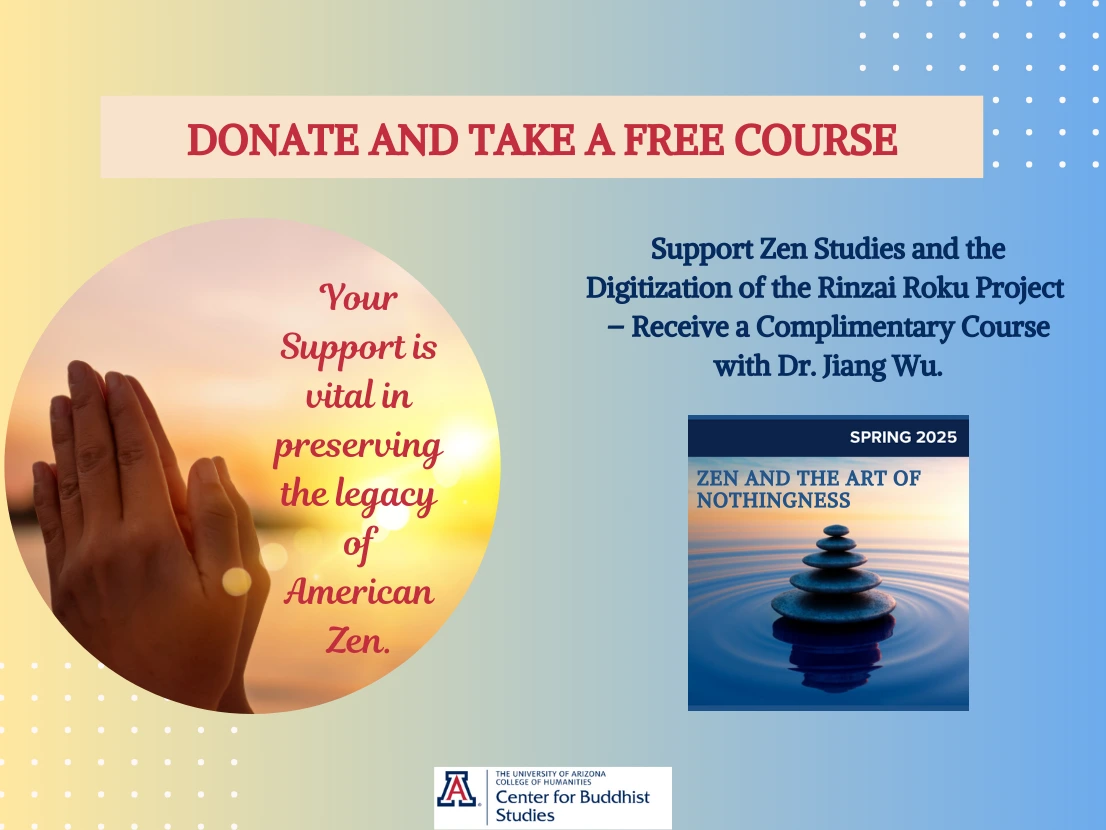Support Zen Studies and the Digitization of the Rinzai Roku Project

Dear Friends of the Center for Buddhist Studies,
The Center for Buddhist Studies at the University of Arizona is thrilled to announce a special opportunity to support the Digitization of Translation Notes of the Rinzai Roku Project, a vital initiative preserving the legacy of American Zen scholarship. With a donation of $1,000 or more, you will receive FREE enrollment (valued at $195) in Dr. Jiang Wu's transformative Spring 2025 course, Zen and the Art of Nothingness, offered through the Humanities Seminar Program.
Support Zen Studies and the Digitization of the Rinzai Roku Project – Receive a Complimentary Course with Dr. Jiang Wu!
About the Course Zen and the Art of Nothingness
Embark on a profound journey through the world of Zen Buddhism with Dr. Jiang Wu, Director of the Center for Buddhist Studies. This course offers:
- A deep exploration of Zen’s history, philosophy, and psychology.
- An understanding of its influence on mindfulness, wellness, and contemporary culture in the East and West.
- Insights into Zen Buddhism’s unique features and its place within the wider Buddhist tradition.
By the course’s conclusion, you will gain a deeper appreciation for Zen principles, their practical applications, and their timeless influence.
Schedule:
- Dates: March 18, 25, April 1, 8, 15, and 22, 2025
- Time: Tuesdays, 2 PM - 4 PM
- Format: Hybrid (attend in person or online)
Location: University of Arizona, Main Campus
Hear directly from Dr. Jiang Wu as he introduces this remarkable course. Watch the engaging promotional video here.
Why Your Donation Matters: Preserving American Zen!
Your generous donation will directly contribute to the "Digitization of Translation Notes of the Rinzai Roku," an essential project undertaken by the Center for Buddhist Studies.
About the Project:
This project seeks to preserve the legacy of American Zen by digitizing and making publicly accessible the critical translation notes of the Rinzai Roku (Record of Linji, Linjilu 臨濟錄 in Chinese), a foundational Zen Buddhist text by Linji Yixuan 臨濟義玄 (d. 866), founder of the Linji/Rinzai School.
Originally translated during the 1950s “Zen boom,” these notes represent a pioneering effort to bridge East Asian Buddhist traditions and American intellectual circles. The project was led by a distinguished team—including Ruth Fuller Sasaki, Philip Yampolsky, Burton Watson, Gary Snyder, Iriya Yoshitaka 入矢義高, and Yanagida Seizan 柳田聖山—who later became influential figures, greatly advancing Chan/Zen studies and shaping contemporary American culture.
In 2017, the Center for Buddhist Studies acquired around sixty binders of the translation notes of the Rinzai Roku from Thomas Kircher, editor of the Rinzai Roku translation, in Japan. These binders are currently preserved in the Center’s library at The University of Arizona. The fifteen binders digitized so far feature multilingual printed and handwritten notes in English, Chinese, Romanized Japanese, and Sanskrit, along with diagrams of sources, and maps of Chan monasteries. The multilingual content offers valuable insights into the historical and cultural translation processes and serves as an invaluable teaching tool for understanding how East Asian religious classics were rendered into English. A sample of one of these binders is available on our website at “Rare Buddhist Texts Archive.”
The digitization project ensures that these materials:
- Are preserved for future generations.
- Become accessible to scholars and students worldwide through library system.
- Serve as invaluable resources for teaching translation studies and deepening our understanding of classical Zentexts.
Our Center is collaborating with the University of Arizona Libraries, the Center for Digital Humanities, Zhejiang University’s China Academic Digital Associative Library (CADAL) and University of South Dakota Library. This partnership provides expertise in archival preservation, digital scanning, and metadata, ensuring that the archives will be fully searchable within the CADAL system.
Your donation will help make these critical materials publicly accessible, preserving the legacy of American Zen and empowering scholars, translators, and cultural historians worldwide.
How to Donate
Make a donation of $1,000 or more to the Center for Buddhist Studies online by credit card, please visit https://give.uafoundation.org/results?id=21a0122a-2300-48e1-87ca-52801498144f. We recommend that credit card gifts be made online before December 31 to ensure immediate tax year gift credit.
For donation by check, please make it payable to the “University of Arizona Foundation” and note the Center for Buddhist Studies at College of Humanities in the memo line. Checks can be delivered directly to Swede Johnson Building (1111 N Cherry Ave) and should be put in the Financial Services box in the lobby, or mail your check to:
The University of Arizona Foundation
P.O. Box 210109
Tucson, AZ 85721-0109
Checks received via U.S. mail will be processed and receipted according to the postmark date on the envelope in which the check was received. Any check received in an envelope postmarked December 31 or earlier will be processed and receipted as a gift.
For all other types of gifts or questions, please call UA Foundation Donor Services at 520-621-5491 or 1-800-409-9791.
How to Claim Your Complimentary Course
- Send proof of your donation—either a receipt or a screenshot—to our email at buddhist-studies@arizona.edu.
- Once we confirm your donation, our staff will send you the registration details for the course.
- Donations from US taxpayers are eligible for tax deduction of the year.
Together, we can preserve the past, educate the present, and inspire the future.

